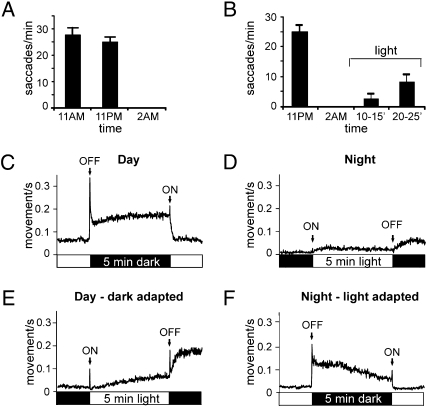Fig. 3.
Zebrafish behavioral responses to light are abolished at night but can be partially restored by continuous exposure to light. (A) Larval zebrafish exhibit a robust OKR at 11:00 AM and 11:00 PM (shortly before the lights are turned OFF at night) but not at 2 AM (3 h after the lights were turned OFF, n = 20 for each time point). (B) Light-adaptation during the night reverses the loss of OKR responses. OKR responses were taken at 11 PM, 2 AM, and at two time points after exposure to light starting at 2 AM: 10–15 and 20–25 min. (C) Larval zebrafish displayed ON and OFF visual-motor responses VMR during the day but fail to exhibit transient startle responses at night (each trace represents an average of 240 responses from 80 individual fish). During the daytime, motor output increased in response to a 5-min light off stimulus with prominent OFF and ON responses (first stimulus was introduced at 2:00 PM). (D) At night, the VMR responses to a 5-min light stimulus were abolished (first stimulus was introduced at 2:00 AM). (E) Dark-adaptation during the day does not abolish VMR responses. Fish, dark-adapted for 3 h, were then exposed to a 5-min light stimulus (first light stimulus was introduced at 2:00 PM). (F) Light-adaptation at night prevents the loss of visual responsiveness and restores VMR responses. Fish were first light-adapted for 3 h starting at 11:00 PM and then exposed to 5-min of darkness (first lights off stimulus was introduced at 2:00 AM).

